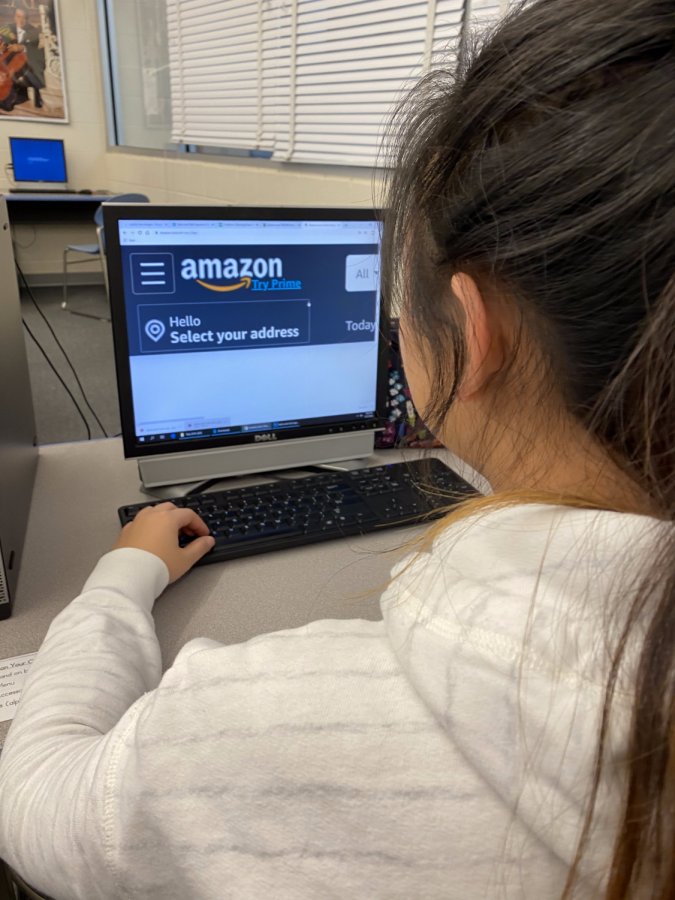Amazon: tread carefully or get broken up
As COVID-19 cases continue to rise, millions of Americans take on holiday shopping from the comfort of their home.
February 5, 2020
Amazon Prime shipping means avoiding lines at the store. In seconds, Alexa streams whatever music commanded of her from Spotify, as well as radio and podcasts. The trillion-dollar company has expanded into virtually every market weaving its services throughout millions of lives and turning itself into one of the most powerful companies in the world. However, with Amazon engulfing commerce and dominating markets, its monopolistic-like power calls for more taxation and antitrust regulation by agencies such as the Federal Communications Commission (FCC).
According to the 2019 Statista report, Amazon’s annual revenues hit over $230 billion, pushing the rapidly growing company into a multitude of different markets with the aim of becoming the leader in each one. “Amazon’s ambition goes far beyond dominating markets,” economics researcher and co-director of the Institute for Local Self-Reliance Stacy Mitchell said in an interview with OneZero. “Its intention is to control the basic infrastructure that commerce runs on.” This resolution has dangerous consequences on on other commerce companies.
Currently, more than half of every dollar spent in online retail goes into Amazon’s pocket. As of the last reporting period, Amazon had over 300 million active users, effectively forcing sellers to lower costs in order to advertise on their website. For the past few decades, Amazon has successfully built up market share by underpricing competitors, giving out top advertising privileges to its own products and other brands that can be sold at a profit. These practices hurt other businesses.
In addition, Amazon’s widespread use of data analytics makes its business strategies even more threatening to other companies. As Amazon is able to collect data from users as they navigate the site, it allows them to understand a customer base better than their competitors and present themselves as a convenient and reliable option. There is also worry that their use of data could soon become an invasion of consumer privacy. “There is a fundamental problem when one company can control the supply, demand, distribution, cost, information and rules of the market they are in,” Adonis Hoffman, a former Chief of Staff at the Federal Communications Commission, told Fox Business.
Just as airlines and cars have regulations, it is time for the U.S. government to pursue antitrust laws and enforce the rules of the competitive marketplace on powerful companies like Amazon. Congress should define the scope of regulatory power so that government agencies like the FCC and the Federal Trade Commission FTC) are able to have clear and broad authority to prevent dominant companies from evading its oversight, abusing their powerful market positions, and restricting vigorous and fair competition.
However, more regulation does not equate to breaking up Amazon at this moment. Although there are many risks for having a company be too dominant, the reality of Amazon is that it provides many beneficial services, topping the most customer satisfaction studies and embodying modern innovation, efficiency, and ingenuity. Although Amazon has been the cause of many small towns becoming a monoculture industry, it has ultimately reinvigorated a plethora of local economies and has not greatly hurt consumers with predatory pricing, which is the yardstick typically used to prove anti-competitive behavior.
Although Amazon does not necessarily need to be broken up, it should still be held accountable to taxes. Based on reports from the Institute on Taxation and Economic Policy, Amazon was subject to a 21 percent tax rate on its U.S. income in 2018 but did not have to pay a cent in federal taxes for the second year in a row, despite nearly doubling its profits to $11.2 billion. Amazon could become an incredibly profitable monopoly unless strict taxes and substantial laws are enforced.
Finally, too much reliance on Amazon could blind consumers from the potential, darker aspects of the company’s ambition. Just recently, a lawsuit was brought into two federal court systems, where Sonos sought financial damages for Amazon undercutting their speaker prices. The FCC must step in to enforce taxation and antitrust regulation in order to prevent Amazon from becoming a monopoly power and properly fulfill the government’s role in protecting America’s open-market economy.



